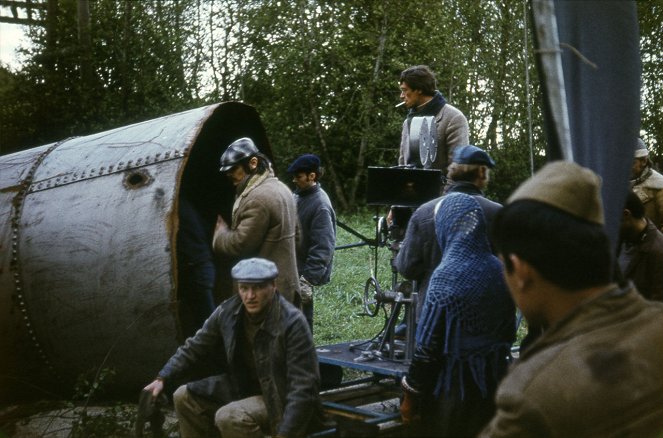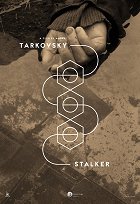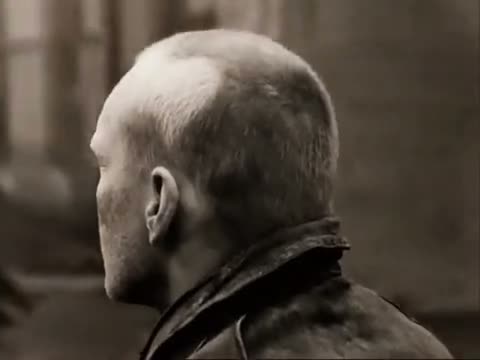Directed by:
Andrei Arsenyevich TarkovskyComposer:
Eduard ArtemyevCast:
Aleksandr Kaydanovskiy, Anatoly Solonitsyn, Nikolay Grinko, Alisa Freyndlikh, Natasha Abramova, Faime Jurno, Ye. Kostin, R. Rendi, Sergey Yakovlev (more)VOD (3)
Plots(1)
The film follows three men - the Scientist (Nikolai Grinko), the Writer (Anatoliy Solonitsyn), and the Stalker (Alexander Kaidanovsky) - as they travel through a mysterious and forbidden territory in the Russian wilderness called the "Zone." In the Zone, nothing is what it seems. Objects change places, the landscape shifts and rearranges itself. It seems as if an unknown intelligence is actively thwarting any attempt to penetrate its borders. In the Zone, there is said to be a bunker, and in the bunker: a magical room which has the power to make wishes come true. The Stalker is the hired guide for the journey who has, through repeated visits to the Zone, become accustomed to its complex traps, pitfalls, and subtle distortions. Only by following his lead (which often involves taking the longest, most frustrating route) can the Writer and the Scientist make it alive to the bunker and the room. As the men travel farther into the Zone, they realize it may take something more than just determination to succeed: it may actually take faith. Increasingly unsure of their deepest desires, they confront the room wondering if they can, in the end, take responsibility for the fulfillment of their own wishes. (official distributor synopsis)
(more)Videos (3)
Reviews (9)
Better is bitter happiness than a boring life. A powerful philosophical work with many metaphors that screams at the viewer throughout its two and a half hour runtime: "Either you will attentively watch me the entire time and get everything, or you will try to watch me as an ordinary disposable product and get nothing." The sea of Tarkovsky's thoughts, supported by minimalist and mystical music and wonderfully detailed camera work, brought me an unprecedented viewer experience and one of the most intellectually stimulating films of my life.
()
A gem that demands quite a lot from the viewer. Stalker basically transcends the boundaries of the medium, rather than a film, it’s a philosophical composition that you can grasp in any way, and no one can say their interpretation is the right one – or the wrong one, depending on how you look at it.
()
Stalker was the last film that Tarkovsky shot in the Soviet Union, as usual after a series of obstacles from the authorities, in addition to using inferior film material. The greater the obstacles from the Soviet authorities, the greater the informal prestige enjoyed by Tarkovsky from intellectuals and other filmmakers. He chose the novel "Roadside Picnic" by Arkady and Boris Strugatsky as the source material, which was published in the 70s. It is one of the most important works by these authors and one of the fundamental works of science fiction that shaped my reading profile. The collaboration between Tarkovsky and the Strugatsky brothers was very difficult because Tarkovsky was a unique and stubborn artist who did not recognize compromises and had a significantly different idea of the final form of the film compared to the brothers as the scriptwriters. He perfectly stripped almost all the motifs of the sci-fi genre from the film, which is a demanding philosophical and psychological study of man. The mysterious zone, which has a concrete origin in the novel, serves Tarkovsky as a metaphor for a reminder of recent events in the Soviet Union, namely the existence of the Gulag archipelago and the massive injustice that was taking place on Soviet territory. The shaved head of the Stalker is also a reminder of the prisoners from the Soviet labor camps. As a genre film, Stalker certainly does not work and its classification as science fiction is misleading. Openly speaking, "Roadside Picnic" would deserve a more dignified adaptation for the big screen from this perspective. The Strugatsky brothers were very disappointed with the final form of the film, but Tarkovsky had such exceptional prestige that they did not dare to protest. After all, he left abroad shortly after. Despite the above, it is worth watching Tarkovsky's film because this filmmaker had an exceptional talent for working with images, a refined artistic gift, and could work excellently with the camera. The long several-minute shots may seem boring at first, but when one surrenders to the atmosphere, they will be richly rewarded. As a fan of the Strugatsky brothers, I am not satisfied with the way Stalker turned out, but a viewer who is not a fan of science fiction but rather a more demanding artistic spectacle will enjoy it. Overall impression: 60%.
()
"Hardness and strength are companions of death, weakness and flexibility are an expression of the freshness of being." The notion of human humility against the belief in one's infallibility, power, and exclusivity - which proves to be fragile and uncertain when it comes to revealing what is truly inside, what this belief is truly based on. A film containing countless stimuli for reflection, from which everyone can take away something different in the end, but will certainly not be the same as when they came to the film at the beginning - just like Stalker, The Writer, and The Professor after visiting the "Zone."
()
This is exactly one of those movies that I will have to see again in order to appreciate it. Tarkovsky uses an interesting form which immediately impresses you - I mean the color scheme, which has two different forms. But it is a demanding work that requires your attention, it requires you to think. However, it is definitely worth watching.
()
Gallery (70)
Photo © Mosfilm



Ads